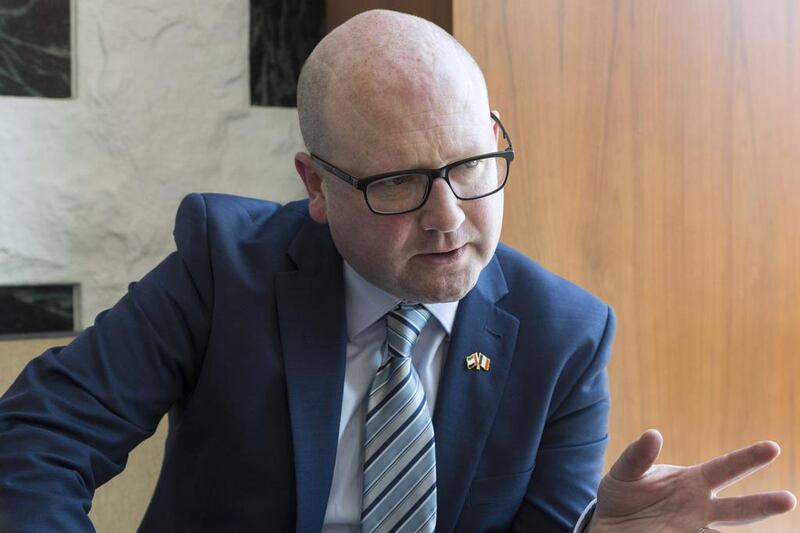You certainly cannot accuse the Irish of failing to take the Arabian Gulf region seriously.
For the past year there has been a steady stream of ministers and trade delegations heading this way from Dublin.
Whereas previously Irish politicians and businessmen would have looked naturally to Britain, continental Europe and America as their main business destinations, now they include the Middle East on that list.
Gerald Nash, the Irish minister for business development, is the latest to make the trip, on a visit to the UAE aimed to coincide with the Arab Health conference currently being staged in Dubai. “Ireland takes the UAE very seriously indeed. There are synergies between the Emirates and Ireland in many areas, and we see huge opportunities for Irish business here. Our economy is back in a growth phase and we see the UAE, and the Gulf region, as a partner in that growth,” says Mr Nash.
There is also a new self-confidence about Irish ministers and businesspeople coming to the region. A couple of years ago, the message was a barely disguised plea for support for the bombed-out Irish financial system, with equity stakes and ownership of Irish financial institutions up for grabs among the big capital pools of the Gulf.
Now the relationship reflects more a position of equality. Having successfully been through the “austerity” process demanded by international creditors, the Irish once again have an economy and a business proposition worth considering.
The Irish economy is heading for 4 per cent growth this year, perhaps the best rate in Europe, unemployment is falling and the world’s capital markets are open to Dublin again at reasonable rates. In a whole range of sectors – health care, construction, technology, food and aviation – Mr Nash sees increasing opportunities for cooperation between the countries. The current trip, although focused on the health sector, has involved bringing about 28 Irish companies to the UAE, across several sectors.
“Having a government minister with you helps open doors at the top level,” he says. “It shows government support for industry, and gets access to the people who run the industry here.”
There are meetings lined up with top health officials in Dubai and Abu Dhabi “to explain how Irish companies can help with the development of the healthcare industry in the UAE”.
Health care in the Emirates has been earmarked as one of the top areas for growth and excellence. Public and private finance has been invested in the sector, with large-scale projects under way in Dubai (for example in Healthcare City) and Abu Dhabi (the Cleveland Clinic on Al Maryah Island.)
There are already long-standing ties between the UAE and Ireland in health care.
The Royal College of Surgeons in Ireland has had a Dubai campus since 2005, helping to train healthcare professionals in the UAE, and there has been a steady flow of Irish doctors and nurses to the Emirates over the years who now form a significant part of the UAE’s 7,000 Irish residents.
“There are some obvious ways to take this forward,” says Mr Nash.
“Ireland is good at areas like preventative medicine and health care, which has obvious applications here in the treatment of diabetes, for example. And we’re also good at the care of the elderly, which is another growing specialism in the UAE.”
Ireland has also developed expertise in life sciences and medical technology, part of its policy of focusing on high-tech industrial sectors, an area much in demand in the Emirates’ hospitals and clinics.
One result of that focus was a deal signed between the Dubai healthcare group Mediclinic and the Irish patient management firm Oneview Healthcare to equip two Dubai hospitals with state-of-the-art medical data systems.
Other sectors have also been earmarked for cooperation. The Irish food industry is represented by Bord Bia on this visit, and aims to exploit Ireland’s position as a growing food exporter, coupled with the UAE’s status as a big importer.
“Food quality and safety is centre stage in Ireland, and we can guarantee safe and reliable standards, with increasing emphasis on halal food,” says Mr Nash.
Other areas of Irish-UAE cooperation are in construction – long an Irish strength but where the UAE is showing increasing expertise – as well as aviation. Etihad Airways has a deal with Irish companies to train aviation staff. An Irish technology company has just linked up with the Al Ansari money transfer business to provide remittance services.
Mr Nash’s trip is a sign of a new Irish confidence in another way, too. It is one of the first of the tripartite trade delegations, with representatives from Northern Ireland and Britain that were established under the peace process that put an end to the Northern Irish troubles.
fkane@thenational.ae
Follow The National's Business section on Twitter





